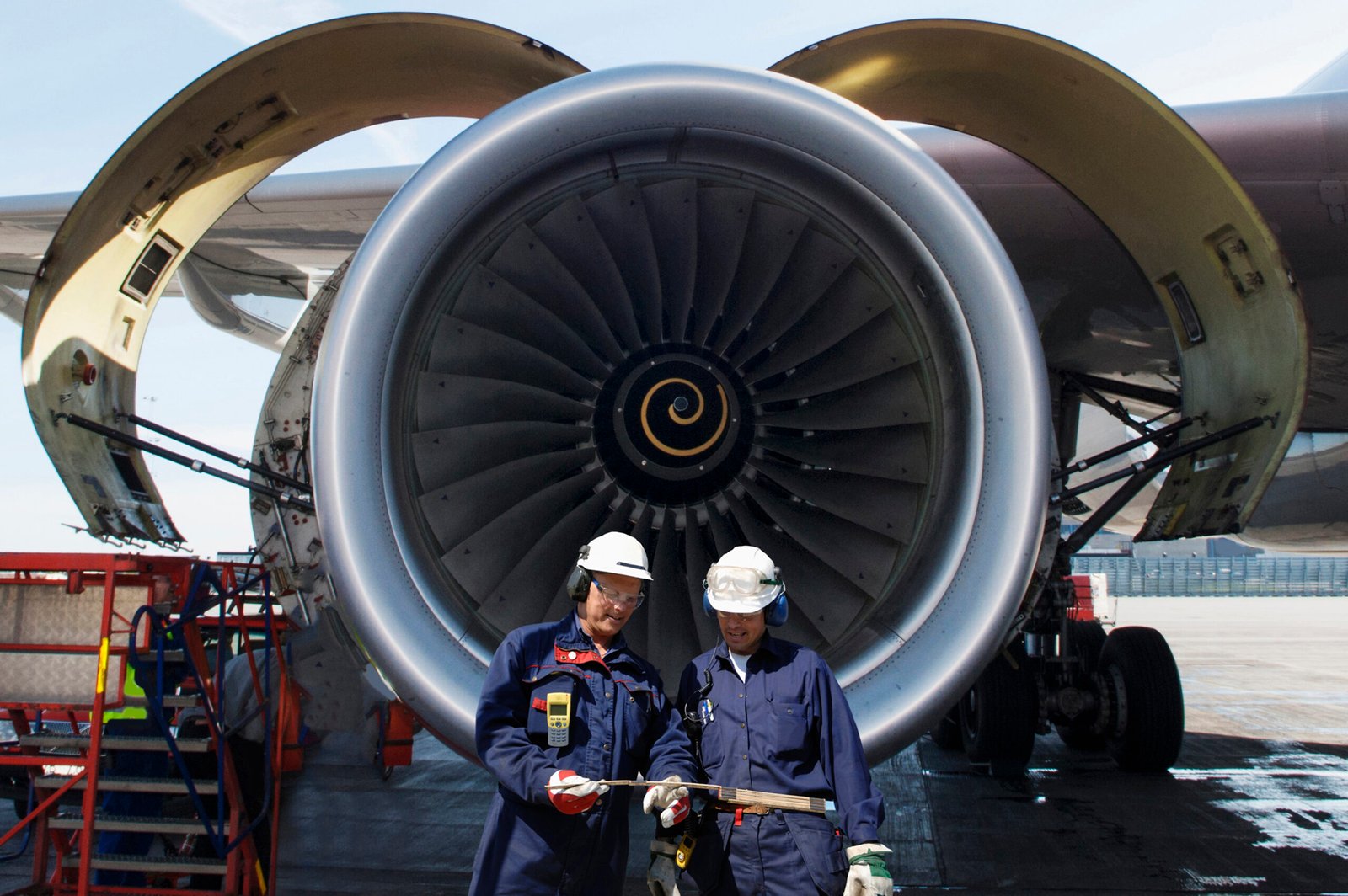Aerospace Technology
The Future of Flight: Innovations Shaping the Aviation Industry
As we soar into a new era of aviation, the sky is no longer the limit—it’s just the beginning. With technological advancements and innovative ideas taking flight, the aviation industry is undergoing profound transformations. From educational pathways to cutting-edge training tools, let’s explore how these developments are shaping the future of flight.
## Aviation Schools by Types of Courses
Education plays a pivotal role in preparing aspiring aviators for their careers. Various types of courses cater to different interests within this expansive field. For those keen on becoming pilots, traditional flight schools offer comprehensive programs that include ground school theory, practical flight training, and specialized certifications like Instrument Rating or Commercial Pilot License.
Meanwhile, aviation management courses focus on the business side of flying—covering topics like airport operations, regulatory compliance, and airline management. These programs equip students with skills essential for overseeing complex aviation enterprises.

For those intrigued by technology’s role in aviation, many institutions now provide courses in aeronautical engineering or drone technology. As unmanned aerial vehicles (UAVs) become more prevalent in both commercial and recreational airspace, knowledge in this area is increasingly valuable.
Finally, maintenance technician programs train individuals to ensure aircraft safety and performance through hands-on experience with engines and systems. The demand for skilled technicians continues to rise as fleets expand globally.
## Lists of Aviation Blogs, Websites, Social Media Sites
For enthusiasts eager to stay updated on industry trends or share insights with fellow aviators, numerous blogs and websites serve as excellent resources:
1. **AirlineReporter** – Focused on airline reviews and news.
2. **AvGeekery** – A captivating blog for aviation aficionados packed with stories from around the world.
3. **FlightGlobal** – Offers comprehensive news coverage on all things aviation-related.
4. **Simple Flying** – An accessible site that covers breaking news about airlines and aircraft.
5. **Pilot’s Digest** – Provides tips for pilots along with interesting articles about flying experiences.

Social media has also become an invaluable tool for connecting with fellow aviators. Platforms like Instagram showcase stunning aerial photography under hashtags like #aviationlovers or #aircraftspotting while Twitter serves as a rapid-fire news source where industry experts share updates using handles such as @AviationWeek or @FltPlan.
## FAA Flight Schools/Airplane-Schools/Simulators
The Federal Aviation Administration (FAA) recognizes various flight schools across the United States that adhere to rigorous safety standards and training protocols. Aspiring pilots can enroll in FAA-certified schools which provide structured curriculums designed to take them from novice flyers to seasoned aviators.
In addition to traditional classroom settings, simulators have revolutionized pilot training by offering realistic environments without leaving the ground. Modern flight simulators replicate almost every aspect of flying—from environmental conditions to cockpit instrumentation—allowing students to gain crucial experience before stepping into real aircraft.
Moreover, many innovative platforms are emerging that utilize virtual reality (VR) technology for immersive training experiences—making it possible for students to practice maneuvers safely and effectively from anywhere they choose.
## Conclusion
As we look ahead into the horizon of aviation innovation—from diverse educational opportunities to groundbreaking technologies—the future appears bright indeed! New generations of pilots will be equipped not only with superior skills but also an understanding of how emerging trends shape air travel’s landscape today—and beyond! Embracing these changes ensures a thrilling journey awaits us all in the skies above!
The Future of Flight: Innovations Shaping Aviation in the 21st Century
As we soar into the 21st century, aviation continues to evolve at an unprecedented pace. From cutting-edge technology to innovative training methods, the industry is on the brink of a transformation that promises to redefine flight as we know it. This post will explore key aspects shaping the future of aviation, including various educational pathways, valuable online resources, and advancements in flight training.
*Aviation Schools by Types of Courses**
Education plays a pivotal role in preparing the next generation of aviators. There are several types of aviation schools catering to diverse career paths within this dynamic field.
1. **Pilot Training Schools**: These institutions specialize in training aspiring pilots through programs that include Private Pilot License (PPL), Commercial Pilot License (CPL), and even Airline Transport Pilot (ATP) certification. Students engage in both ground school and hands-on flying experience.

2. **Aviation Maintenance Schools**: For those interested in aircraft maintenance and repair, these schools offer courses leading to Airframe and Powerplant (A&P) certification. Students learn vital skills such as troubleshooting mechanical issues and performing routine inspections.
3. **Air Traffic Control (ATC) Programs**: With air traffic becoming increasingly complex, ATC programs train individuals to manage airspace efficiently. Coursework includes communication protocols, radar operation, and emergency procedures.
4. **Aerospace Engineering Colleges**: These universities provide a deeper understanding of aircraft design and technology development. Courses often cover aerodynamics, avionics systems, and materials science.
5. **Flight Operations Management Degrees**: Focusing on the business side of aviation, these programs prepare students for roles in airline management or airport operations through classes on logistics, safety regulations, and financial management.
*Lists of Aviation Blogs, Websites, Social Media Sites**
In addition to formal education, staying informed about industry trends is essential for anyone passionate about aviation. A plethora of blogs and websites serve as excellent resources:
**AirlineReporter.com:** Known for its engaging articles on airline experiences.
**FlyingMagazine.com:** Offers insightful content covering everything from pilot tips to equipment reviews.
**AvWeb.com:** A well-rounded site featuring news updates and analysis pertinent to all things aviation.
**Jetwhine.com:** Focuses on insights from experienced pilots and industry professionals.
Social media platforms are also buzzing with aviation enthusiasts sharing their adventures:
On Instagram, follow accounts such as @aviationdaily for stunning aerial photography.
Twitter hosts lively discussions with handles like @avgeekery providing real-time updates.
Facebook groups like “Pilot’s Lounge” foster community among budding aviators by facilitating networking opportunities.
*FAA Flight Schools/Airplane Schools/Simulators**
The Federal Aviation Administration (FAA) ensures high standards for flight education in the United States through its network of recognized flight schools. Enrolling in an FAA-certified flight school guarantees access to professional instructors who adhere strictly to regulatory guidelines.

Additionally, many schools incorporate advanced flight simulators into their curriculum—an invaluable tool allowing students to practice navigation skills without leaving the ground! These simulators replicate real-world scenarios that pilots may encounter while flying commercially or privately.
In conclusion, as innovations continue shaping aviation from educational methodologies to technological advancements in training tools like simulators, it’s an exhilarating time for those entering this field. The blend of traditional knowledge with modern techniques ensures that future pilots will not only be equipped but also empowered to navigate the skies safely for years ahead!
The Sky’s the Limit: Innovations Transforming the Aviation Industry
In an era where technological advancements dictate the pace of progress, the aviation industry stands as a testament to innovation and evolution. From the ground up, future aviators are being equipped with skills that align with both emerging technologies and traditional practices. For those interested in entering this dynamic field, understanding the various educational pathways is crucial.
*Aviation Schools: Types of Courses**
When it comes to training for a career in aviation, options abound. Prospective pilots have several types of courses to choose from:
1. **Private Pilot License (PPL)**: This fundamental course introduces students to basic flying techniques, navigation, and safety protocols. Ideal for hobbyists or those contemplating a professional path.
2. **Commercial Pilot License (CPL)**: A step up from PPL, CPL coursework includes advanced flight maneuvers and regulations necessary for commercial flying.
3. **Airline Transport Pilot License (ATPL)**: Aspiring airline pilots will find this course essential; it encompasses more rigorous training and a deeper understanding of aviation laws.
4. **Flight Instructor Courses**: Once certified as a pilot, many opt to become instructors themselves. These courses focus on teaching methods alongside flight operations.
5. **Aircraft Maintenance Technician Programs**: Not everyone who loves aviation wants to fly; these programs train individuals in aircraft repair and maintenance, ensuring pilot safety and airworthiness.
6. **Unmanned Aircraft Systems (UAS) Training**: With drone technology soaring in popularity, specialized courses prepare students for careers involving UAVs across various industries.
7. **Air Traffic Control Programs**: These programs emphasize communication skills and operational procedures vital for managing air traffic effectively.
Each type of course opens doors to unique career opportunities within the vast landscape of aviation.
*Aviation Blogs, Websites, Social Media Sites**
Staying updated on industry trends is essential for anyone involved in aviation—whether it’s aspiring professionals or seasoned veterans. Here’s a selection of valuable resources:
**Blogs**:
– *The Air Current*: Focuses on market analysis and insights into airline strategies.
– *Flying Magazine*: Offers tips from experienced aviators along with gear reviews.
– *Jetwhine*: A lively community discussion platform covering all things related to commercial aviation.
**Websites**:
– *AOPA.org*: The Aircraft Owners and Pilots Association provides extensive resources for pilots.
– *FAA.gov*: The Federal Aviation Administration’s official site offers regulations, guidelines, and updates crucial for pilots.
– *FlightAware.com*: Real-time tracking of flights worldwide—perfect for data enthusiasts!
**Social Media Sites**:
– Follow accounts like @AvGeekCommunity on Instagram or Twitter which celebrate all aspects of flight culture.
– LinkedIn groups such as “Aviation Professionals” foster networking among industry insiders.
These platforms not only share knowledge but also connect individuals passionate about aviation globally.
*FAA Flight Schools/Simulators**
The Federal Aviation Administration oversees numerous accredited flight schools throughout the United States that cater to different skill levels and specialties. Many institutions offer state-of-the-art simulators that mimic real-life flying experiences without leaving the ground—a fantastic tool for practicing maneuvers safely before taking off into actual skies!
Simulators provide an invaluable resource by allowing students to encounter challenging scenarios within a controlled environment while mastering their technical skills without any risk involved.
In conclusion, whether you’re planning your first solo flight or considering a career change into air traffic control or aircraft maintenance, there has never been a better time to explore what aviation has to offer! With innovative educational programs at your fingertips combined with cutting-edge technology continually reshaping how we think about air travel and safety standards—the sky truly is the limit!

The Future of Flight: Innovations Shaping the Aviation Industry
As we soar into a new era of aviation, an array of innovations is transforming how we think about flight. From advanced training methodologies to cutting-edge technology in aircraft design, the possibilities are endless. In this blog post, we’ll explore the types of aviation schools available today and highlight essential resources for aspiring aviators.

### Aviation Schools by Types of Courses
Aviation education has diversified dramatically over recent years, accommodating various career paths within the industry. Here are some notable types of courses you might find:
1. **Pilot Training Programs**: These programs focus on teaching students how to fly different aircraft. They typically include ground school lessons covering aerodynamics, meteorology, navigation, and regulations, followed by actual flight training with certified instructors.
2. **Aircraft Maintenance Engineering**: For those intrigued by the mechanical side of aviation, these courses cover everything from basic avionics to complex systems maintenance. Students learn essential skills that ensure airplanes remain safe and efficient.
3. **Air Traffic Control Training**: This specialized program prepares individuals for one of the most demanding roles in aviation—managing air traffic safely and efficiently. Students undergo rigorous training that combines theoretical knowledge with practical simulations.
4. **Aviation Management Degrees**: Focusing on the business aspect of flying, these courses delve into airport operations, airline management, and regulatory issues affecting the industry. Graduates often find themselves well-prepared for leadership roles in various sectors.
5. **Commercial Drone Operations**: With drones becoming increasingly prevalent in many industries—from agriculture to photography—courses focusing on drone piloting are gaining popularity. They teach students about regulations and operational protocols specific to unmanned aerial vehicles (UAVs).
### Lists of Aviation Blogs, Websites, Social Media Sites
The digital landscape is teeming with valuable resources for aviation enthusiasts and professionals alike. Here’s a curated list to help you navigate through it all:
**Blogs**:
– *AirlineReporter*: Focuses on airline news and travel experiences.
– *Flying Magazine*: Offers insights ranging from pilot tips to aircraft reviews.
– *Jetwhine*: An engaging take on aviation topics including technology advancements.
**Websites**:
– *AOPA (Aircraft Owners and Pilots Association)*: A hub for pilots seeking resources and advocacy.
– *FlightAware*: Real-time information about flights worldwide.
– *AvGeekery*: Celebrates all things aviation with articles that captivate enthusiasts.
**Social Media Sites**:
– Instagram accounts like @aviationdaily provide stunning visuals from around the world.
– YouTube channels such as *Mentour Pilot* break down complex topics into digestible content.
– Twitter handles like @FlyByWireSim keep followers updated on simulation innovations.
### FAA Flight Schools/Airplane Schools/Simulators
When it comes to formal education in flying or maintaining aircraft, FAA-approved schools lead the charge. These accredited institutions meet stringent safety standards while providing quality instruction across various disciplines:
Many FAA flight schools offer integrated programs where students can earn their private pilot licenses alongside advanced certifications like instrument ratings or commercial licenses.
Notably, airplane schools often incorporate simulator training into their curricula—an invaluable tool that allows students to practice emergency procedures without risk while gaining critical experience navigating various flight scenarios under realistic conditions.
In summary, as technological advancements continue reshaping the skies above us, so too does our approach to learning within this dynamic field. Whether you’re interested in flying high or keeping planes soaring smoothly through meticulous maintenance work or effective traffic management—the future is bright! Embrace these educational pathways and be part of the exciting evolution occurring within the world of aviation!
Flying Into the Future: The Latest Innovations in Aviation Technology
The aviation industry stands on the brink of a technological revolution, blending tradition with cutting-edge innovations. From training pilots with advanced simulators to the rise of drones and online learning platforms, the future is taking flight in ways we could hardly imagine just a decade ago. Let’s delve into some of the latest advancements transforming how we approach aviation.

*Aviation and Technology Training: Simulators**
Gone are the days when aspiring pilots had to rely solely on real aircraft for training. Today, flight simulators have become an integral component of pilot education. These sophisticated tools replicate real-world flying conditions with stunning accuracy, allowing trainees to experience everything from routine maneuvers to emergency situations without leaving the ground.
Modern simulators incorporate virtual reality (VR) technology, making training sessions immersive and realistic. Learners can engage in simulated flights that mimic weather changes or mechanical failures, thus better preparing them for actual flight scenarios. This innovative training not only enhances safety but also optimizes costs associated with traditional flight instruction.
*Essential Aviation Blogs and Resources**
For those who want to stay informed about ongoing developments in aviation technology, numerous blogs and websites serve as valuable resources:
1. **The Points Guy** – Focuses on travel tips and airline news.
2. **Airliners.net** – A community-driven site showcasing photos and discussions on aviation topics.
3. **Aviation Week** – Offers insights into aerospace trends, technology advancements, and industry analysis.
4. **FlightGlobal** – Provides updates on airlines, aircraft manufacturers, and regulatory changes.
5. **Jetwhine** – A mix of opinions on aviation issues along with entertaining stories from pilots.
Social media platforms like Twitter feature hashtags such as #AvGeek or #PilotLife that connect aviation enthusiasts globally. Following accounts of airlines, flight schools, or influential aviators can keep you updated while also building your network within this exciting field.
*Online Aviation Courses: Ground Schools & Careers**
The advent of online education has made it easier than ever to pursue a career in aviation without geographical constraints. Many organizations offer comprehensive online courses that cover foundational knowledge essential for aspiring pilots or those looking to start careers in ground operations.
These courses often include Ground School programs that prepare students for FAA certification exams while providing flexible scheduling options—ideal for busy individuals juggling work and study commitments. Platforms like Coursera or Udemy host various programs ranging from introductory pilot training to specialized subjects such as air traffic control or aircraft maintenance.
With growing demand for qualified pilots due to global travel resuming post-pandemic, many airlines actively recruit trained professionals through dedicated job boards like PilotJobs.com or Avjobs.com.
*The Drone Revolution**
Drones have emerged as one of the most intriguing facets of modern aviation technology. With applications ranging from aerial photography to package delivery and agricultural surveillance, these unmanned aerial vehicles (UAVs) are reshaping industries across the board.
Regulatory bodies like the Federal Aviation Administration (FAA) provide guidelines around drone usage ensuring safety while promoting innovation in this sector. Their website offers comprehensive resources about drone registration processes along with information concerning Part 107 licensing—a must-have for commercial drone operators.
In conclusion, as we fly into an exciting future where technology meets traditional practices within aviation, staying updated through reliable sources becomes vital for enthusiasts and professionals alike. Whether it’s embracing simulator training or exploring online courses tailored specifically for aviation careers—or even navigating the new world of drones—the sky truly is not the limit; it’s just the beginning!





